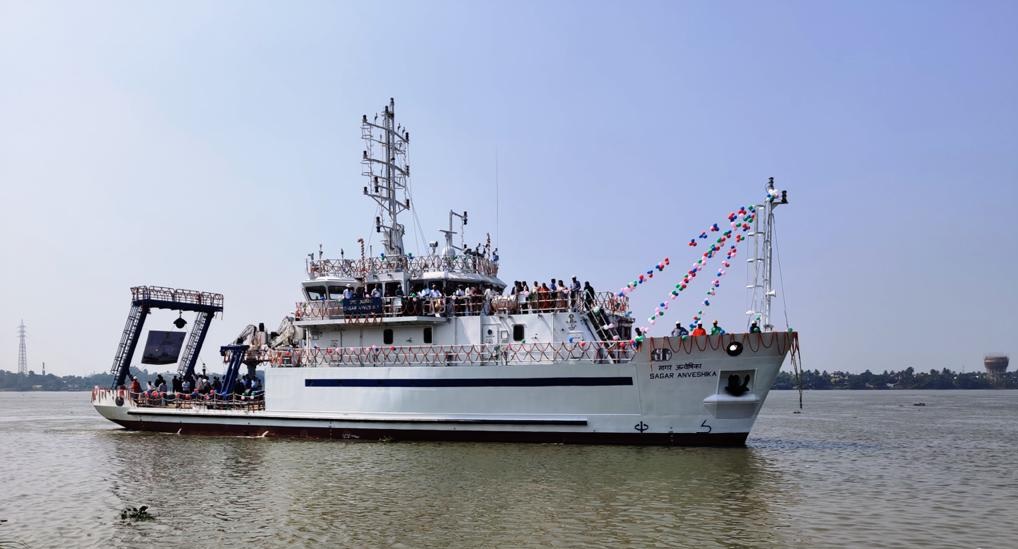India’s marine scientific research capability has received a boost with the commissioning of coastal research vessel (CRV) Sagar Anveshika. The vessel joins the fleet of three other vessels of the same class — Sagar Tara, Sagar Nidhi, and Sagar Sampada — and will help Indian scientists to undertake a variety of oceanographic research tasks.
The vessel is fitted with ‘state of the art’ laboratories and 25 scientists can be embarked to conduct research. The onboard submersible can dive six kilometers below the sea and the scientists would be able to undertake research for nearly 16 hours. This capability, is a shot in the arm of India’s scientific knowledge of oceans and sea. Sagar Anveshika, according to Union Minister Harsh Vardhan, would also augment India’s Blue Economy, which figures prominently in the country’s march towards sustainable development of sea based resources.
Blue Economy is now considered as the fountainhead of a number of national priorities which can potentially trigger national growth, economic prosperity and job creation. While dedicating the Kochi-Mangaluru natural gas pipeline to the nation last week, Prime Minister Modi stressed that Blue Economy will be an important source of ‘Aatamnirbhar Bharat’ and sketched out a multi-pronged plan for “improvement of coastal infrastructure and protecting the marine ecosystem”.
At the heart of marine scientific research and Blue Economy is data which is generated by sensors, machines and humans. A large number of platforms, observation stations and monitoring devices are embedded-positioned at vantage locations under the sea, on the water, and in the space. These continuously observe, collect and transmit scientific data which is characterized by 5Vs i.e. ‘volume, velocity, variety, veracity and value’.
Besides, it is a mix of structured and unstructured data and therefore presents major challenge for scientists to obtain clear trends, determine outcomes and initiate responses. There will be in future billions of devices receiving/transmitting zettabytes (ZB) of data and would therefore would have to be kept in special storages.
Union Minister Harsh Vardhan dedicating Sagar Anveshika to the nation. The vessel is capable of supporting multidisciplinary research in various fields e.g. marine biogeochemistry, physical Oceanography esp coastal pollution, marine biota’s impact on climate change and assessment of marine resources[/caption] Fourth Industrial Revolution (4IR) technologies led by artificial intelligence (AI), machine learning (ML), internet of things (IoT), Bigdata, etc., are transforming MSR.
There is strong evidence of system automation, smart sensors are being positioned and are linked to networks for data transfer. Also, unmanned and remote-controlled platforms are conducting semi or fully autonomous operations which augment MSR. Significantly, growing digitalization and the ever expanding use of electronic data has transformed the way MSR is conducted. Similarly, 4IR technologies are fast becoming critical for Blue Economy so that sea based living and non-living resources are extracted in a sustainable manner.
Several 4IR technologies are adding to computing strengths and crunching data for a more sophisticated understanding of the natural resources so that these can be carefully harnessed and protect the environment and ecology. 4IR is also being used for counting whales by using machine-learning algorithm that integrate data obtained from satellites, sonar, radar, human sightings, ocean currents etc. It is useful to mention that whales are a carbon sink as they store carbon in their bodies while they are alive as also after they are dead.
Interestingly, 4IR technology is also helping counter Illegal, Unreported and Unregulated (IUU) fishing also referred as ‘pirate fishing’. IUU is a major environmental issue given that one out of every five fish is caught illegally and losses due to IUU fishing could be as high as US$10 to 23 billion. Besides, fishery related crimes threaten food security with direct impacts on the economic-social-environmental-ecological security of coastal states.
Blockchain technology is being put to use to counter IUU fishing by tracking data concerning the place where fish was caught, when it was landed, packed and shipped to its final destination. There is little doubt that 4IR technologies are is critical for MSR and Blue Economy, India needs to invest in skilled human resource.
Sector-specific talent development is imperative for a number of white (administrative and institutional) and blue (products and services) collar jobs. Similarly, vocational institutions are critical for promoting, training and skilling workers with 4IR tool kits to support MSR and Blue Economy. The role of entrepreneurs, start-ups, medium and small enterprises cannot be underestimated. In this context, a national agenda of ‘4IR skill development’ dovetailed into ‘make in India’ and ‘digital India’ would support the development of a MSR and Blue Economy.
(Dr Vijay Sakhuja is former Director National Maritime Foundation, New Delhi)




















